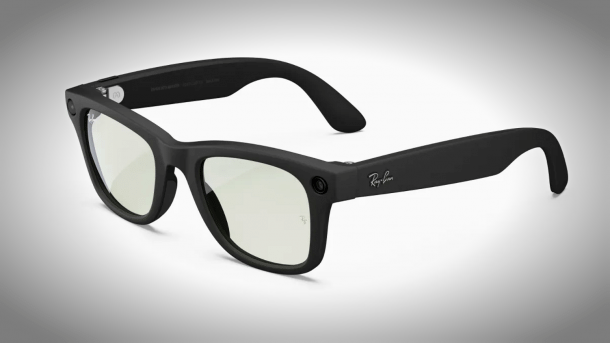Students identify passers-by with Metas smart glasses
Two Harvard students have succeeded in identifying strangers on the street just by looking at them. This was made possible by Meta's new smart glasses.

Meta's AR glasses designed with Ray Ban are very discreet.
Two Harvard students have repurposed an alumnus' invention: AnhPhu Nguyen and Caine Ardayfio used Meta's recently unveiled smart glasses to identify passers-by on the street in real time. In a video, they show how anyone can theoretically do the same.
Meta CEO and Facebook inventor Mark Zuckerberg, who also visited the American elite university, presented his Orion glasses, also known as Ray Ban Meta Smart Glasses, to the public this month. They are already on sale and offer many possibilities for using augmented reality in everyday life.
Glasses recognize faces on the street
The ability to match the face of anyone around you with publicly available databases to instantly obtain their identity and other information is probably not one of the things Meta primarily wants to enable its customers to do.
And yet the project, called I-XRAY, can theoretically be replicated by other users – Nguyen and Ardayfo explain what it takes in a publicly available document. The meta smart glasses allow you to stream your own field of vision live on Instagram. The students did this and used a computer program that monitored the stream and recognized the faces using AI. The photos were then fed into public databases to find names, addresses, telephone numbers and even relatives. The students then received this information directly on their smartphones.
Creepy encounters
They show the creepy results in a self-published video: One of them, for example, walks through the Harvard Metro station and addresses a passer-by by name. "I've read some of your publications, really great work," the student praises the man, who seems somewhat taken aback. No wonder: his conversation partner had probably found the publications in question just seconds before on the Internet – thanks to meta glasses on his nose.
Empfohlener redaktioneller Inhalt
Mit Ihrer Zustimmung wird hier ein externer Inhalt geladen.
Ich bin damit einverstanden, dass mir externe Inhalte angezeigt werden. Damit können personenbezogene Daten an Drittplattformen übermittelt werden. Mehr dazu in unserer Datenschutzerklärung.
Meta's new glasses actually have a so-called privacy light to prevent this from happening. A small light on the front that clearly shows the other person that augmented reality is currently processing data – of whatever kind – However, critics have already complained that this light is difficult to see, especially outside closed rooms, due to the lighting conditions.
Students want to highlight risks
The two students emphasize in their document that they do not want to make their project publicly accessible – even though they have already disclosed virtually all the components and their interaction. Their main aim was to draw attention to the risks of the technology. In their document, they also explain how you can protect yourself from being found by the face search engines used.
In an interview with The Register, the two students say that 99 percent of their experimental set-up would also work without the meta-glasses. This may be technically correct, but it ignores the fact that the glasses are socially less conspicuous in many more situations than smartphone image capture. For example, anyone who takes cell phone photos of a stranger in a public toilet is likely to face problems immediately. With connected glasses on your nose, the situation can be different, even in other sensitive places where photography is prohibited.
The debate about glasses with search engines is not new: Google Glasses triggered a similar discussion at the time. However, their exotic design with a mini screen on the side made them much more recognizable to others – in contrast to Meta's glasses, which use a Ray Ban model as a base.
Videos by heise
Zuckerberg also started at Harvard
AnhPhu Nguyen and his project partner Caine Ardayfio both study computer science at the Harvard School of Engineering. Mark Zuckerberg also studied here, but left the university after a few semesters. During this time, he also launched his first social media platform, Facebook, which at the time also brought about entirely new discussions on the subject of data protection.
(nen)